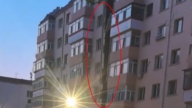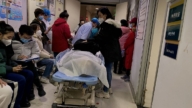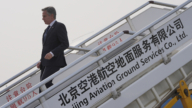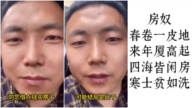【新唐人2011年11月26日讯】广东省委书记汪洋日前强调深化体制改革,他说“自己革自己的命很困难”,并批评政府“不肯放权”。与此同时,广东省宣布放宽社团登记,汪洋提出,要舍得向社会组织“放权”。外界分析,汪洋近日默许广东示威、暂停新闻禁令等动作频频,意图在中共十八大搏上位。
11月22号,在广东省深化体制改革工作会议上,汪洋强调,要敞开大门搞改革。他说:“改革和走路一样,不怕慢,就怕站。”
汪洋批评政府不信任群众,他指出:“很多部门开会就说,它们放了多少多少权,其实都不是关键的权,要命的都没放。”
汪洋在广东各地推行的并不是真正的政治体制改革,而是行政管理体制改革,包括精简机构“大部制”改革、公务员聘任制改革、行政审批制度改革,以及社会体制改革等等。
香港《动向》杂志主编张伟国表示,汪洋的体制改革,并没有触及到中共一党专制的根本。
张伟国:“这样做至少证明他还想与众不同吧。面对十八大这样一个时限,面对薄熙来咄咄逼人的那种挑战,他在广东应该讲是有天时地利。所以,这个选择作为他个人于公于私都是比较明智的。”
广东省日前宣布推进社会组织体制改革,降低各类民间组织登记门槛,简化登记程序。
汪洋说,要加大政府职能转移管理力度,舍得向社会组织“放权”。凡是社会组织能够“接得住、管得好”的事,都要逐步交给它们。
张伟国:“汶川地震以后,我们看到中国的NGO,就是一些非政府组织在社会救济过程当中发挥了巨大的作用。但是因为中共的维稳,所谓把一切只要是非共产党控制的组织,全部扼杀在萌芽当中。汪洋如果不但能说这个话,而且拿出具体的行动来,给非政府社会组织一个生存的空间,那我想广东就可能变成政治特区了。”
香港《开放》杂志总编辑金钟表示,在十八大权斗的背景下,重庆薄熙来“唱红打黑”尽管影响很大,但很多人反感,再要走红的、左的道路,那完全是历史的倒退。
金钟指出,汪洋走的是另外一条路,他走的路比较务实、比较开放、比较大胆。但共产党政治上不开放,汪洋所采取的做法将会有很大的困难。
张伟国:“共产党现在已经是穷途末路,维稳已经到了一个极限,如果下面的各路诸侯能够根据自己的情况走出一条路来,也许给共产党再喘一口气,否则的话大家等于同归于尽。”
目前,太子党薄熙来“唱红打黑”已经失势,进十八大常委已遭到胡温的抵制。另一个太子党习近平也被外界认为是保守左倾、强硬派人物,接班总书记之位则遇到团派汪洋的挑战。
《南方都市报》11月15号发表文章赞扬胡耀邦、赵紫阳的改革功绩,深圳作家朱健国认为,这篇文章还有促使习近平政治改革的意思。
而《维基解密》公布的一份美国外交电文披露,多位消息人士指出,如果习近平真的是胡锦涛的接班人的话,他们会担忧习的领导能力和中共政改的前景。上海美国研究所所长丁幸豪哀痛的说,习近平在浙江和上海的唯一成就就是“什么都不做”。
外界评论指出,中共既得利益集团早已没有政治改革的动力了,但是仍然希望在中共垮台的时候,中共领导人当中能有叶利钦式的开明人物出现,对和平解体中共发挥作用。
新唐人记者常春李元翰、周天采访报导。
Wang Yang promotes system reform based on Decentralization
Secretary of CCP Guangdong Municipal Committee,
Wang Yang, recently stressed to deepen system reform,
saying, “it’s very difficult to against your own life”.
Wang criticized the authorities’ “unwiling to decentralize”.
Meanwhile, Guangdong authorities announced to ease
registration requirements for social organizations.
Wang Yang proposed to decentralize to the social groups.
Analysts say that Wang Yang’s recent approval of
local demonstrations and
releasing of press embargos are aiming at political
promotion at the CCP’s 18th congress.
On November 22 in Guangdong, Wang Yang stressed
at a working conference on deepening the reform,
to widely open the door to reform,
“undertaking reform is the same as walking,
don’t be afraid of slowness,
but of stopping part of the way."
Wang Yang criticized the CCP authorities who do not trust
the people, saying, “
A lot of departments said at meetings how much they had
decentralized, but what they had decentralized were not the key powers."
What Wang Yang has implemented across Guangdong is not
a real political reform, but an administrative system reform.
The reform contains streamlining the organization,
civil servant engagement reform,
the reform of administrative approval, and
social system reform, among others.
Editor-in-chief of Hong Kong’s Trends magazine,
Zhang Weiguo, comments that Wang Yang’s reform
did not touch the root of CCP’s one-party dictatorship.
But his reform has some positive effects.
Zhang Weiguo said: “At least, this can prove he wants
to be unusual.
Facing the time limit of CCP’s 18th congress,
and Bo Xilai’s aggressive challenges, he has gained favorable supporting Guangdong.
So he made quite a wise choice in view of public
or personal concerns. “
Recently, Guangdong authorities announced plans to boost
the social organization system reform,
lowering registration requirements for various civil
organizations to simplify the registration process.
Wang Yang talked about the intention to intensify
the transfer of government function, to be willing to decentralize to the social organizations.
Wang said that all matters that social organizations have the
capability to deal with or to manage, shall be gradually handed over to them.
Zhang Weiguo added: “Since the 2008 Sichuan earthquake,
we’ve seen China’s NGO(non-governmental organizations)
have play a huge role in the process of social assistance.
But due to CCP’s maintenance of stability, all the
non-CCP-controlled organizations have been crushed in the new born egg.
If Wang Yang not only proposes but can put into practice,
a living space for NGO to develop,
then I guess Guangdong will probably
become a special political zone. “
Editor-in-chief of Hong Kong’s Open Magazine, Jin Zhong,
said that in the context of power struggle inside the CCP for the 18th congress,
Secretary of the CCP Chongqing Municipal Committee,
Bo Xilai, launched a campaign of “Singing red songs and suppressing the mafias”,
which made a big difference, but is also incurring
much disgust.
So the intention of taking the path of Maoism again would
be a complete regression in the history.
Jin Zhong points out that Wang Yang takes a different path,
a relatively pragmatic, open and bold road.
Due to CCP’s closed politics, Wang Yang’s
reform could confront great difficulties in the future.
Zhang Weiguo stated: “The CCP is going down death road.
Its stability maintenance has reached a limit.
If its local authorities could manage to explore their own
way, that might help CCP authorities gasp for another breath.
Otherwise, they’ll all perish in the common ruin."
The CCP’s prince ling, Bo Xilai, has so far flagged,
meeting resistances from CCP President Hu Jintao and Premier Wen Jiabao.
Xi Jinping, another CCP’s prince ling, is also considered
as a conservative leftist hardliner,
his potential succession has encountered challenges from Wang Yang,
a key member of Youth League fraction led by Hu Jintao.
Southern Metropolis Daily published an article on Nov. 15,
praising reform achievements made by Hu Yaobang and Zhao Ziyang.
Shenzhen-based writer, Zhu Jianguo, comments that
the article has the intention to push Xi Jinping to carry out political reform.
A U.S. diplomatic cable released by Wikileaks revealed that
several sources worried about Xi Jinping’s leadership
capability and CCP’s prospect of political reform,
if Xi became Hu’s successor.
Director of Shanghai Institute of American Studies,
Ding Hao, said sorrowfully that during Xi Jinping’s tenure
in Zhejiang and in Shanghai,
Xi’s only achievement was “doing nothing."
Comments point out that the CCP’s stakeholders
have already no any impetus for political reform.
But they still expect that when the CCP authorities collapse,
an enlightened person like Yeltsin could appear among
the CCP’s leadership to play a role in the peaceful
disintegration of the CCP authorities.
NTD reporters Chang Chun, Li Jing and Sun Ning





























